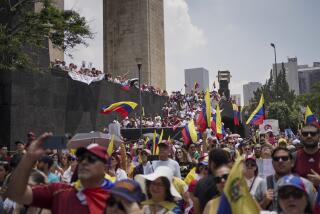Human rights activists say many Venezuelan protesters face abusive government treatment
- Share via
Reporting from Caracas. Venezuela — Venezuelan university professor Sergio Contreras went to demonstrate in central Caracas against President Nicolas Maduro’s government last week and never came home.
After a couple of days of searching for him, his frantic wife, Mariana, caught a glimpse of him being transported to a military base before a closed tribunal charged him with treason and stealing a police firearm.
The accusations — which Mariana Contreras described as absurd, saying her husband is a nonviolent social activist — could bring a sentence of several years in prison. Neither she nor her lawyer have seen or communicated with her husband for days.
Sergio Contreras, who teaches at Andres Bello Catholic University, is one of an estimated 2,300 protesters arrested since demonstrations broke out across Venezuela in late March.
Hundreds of thousands of demonstrators have taken to the streets over the last seven weeks to protest food shortages, rising crime and anti-democratic measures taken by Maduro, including the suspension of elections, neutering the powers of the National Assembly and the barring of opposition candidates from running for office .
The protests have led to frequent violent clashes with police and the national guard in which at least 43 have died and thousands have been injured.
Many of those detained are, like Contreras, being subjected to military justice in violation of Venezuelan law, and held incommunicado, according to the New York-based Human Rights Watch.
“It’s been an exhausting road because we have yet to receive any official information on his situation,” Mariana Contreras said during an interview at her home in the San Bernardino neighborhood of Caracas.
She said images of her 38-year-old husband’s arrest sent to her via social media show police dragging him away by the neck. She insisted that authorities must have planted a gun and explosives on her husband.
“Who knows how because video taken during his arrest shows him speaking into a megaphone with nothing but the jeans and a T-shirt he was wearing,” she said. “I can’t stop thinking of the picture of him getting thrown to the ground. I don’t want our 8-year-old son to see it.”
The Inter-American Commission on Human Rights has condemned Maduro’s “militarization of the management of the protests,” referring to the imprisonment of hundreds of detainees in military installations and subjecting them to summary military justice without the presence of family or attorneys.
Based on interviews with lawyers and family members, Human Rights Watch this week accused the Maduro government of subjecting detainees “to physical and other abuses that may in some cases amount to torture at the moment of arrest or during detention.”
The arrest of Contreras, who is a member of a charitable group that brings food to homeless people, was one of several highlighted Monday by Human Rights Watch in a statement issued jointly with the Venezuela Penal Reform civil society group.
The arrests include examples of “abusive prosecutions of at least 275 civilians by military courts,” the statement said.
Mariana Contreras said she cautioned her husband when they parted company on the morning of May 10. He was headed to a demonstration planned near the Sambil shopping center in central Caracas by opposition legislators, including Freddy Guevara, whom Contreras advises.
“I told him to be careful because the demonstration was planned in a barrio that’s been taken over by colectivos,” a Spanish term used for armed and motorcycle-riding Maduro supporters who have been accused of harassing and on occasion shooting at opposition demonstrators. “All he said was that there would be many opposition assemblymen there.”
After reading later that day on a group Twitter message that her husband had been arrested, she began a two-day search to find out where he was being held.
“I went to five police stations in Caracas until hearing he had been taken to Venezuela’s military counter-intelligence headquarters, which made us suppose he would be brought before a military tribunal, which in fact he was,” she said.
She last saw him being transported in a military truck to his tribunal appearance at Fort Tiuna on May 12.
The Human Rights Watch statement cited the Venezuelan constitution, which “limits military jurisdiction to crimes that are of military nature.” It also cited Venezuela’s signature on a 1978 international civil rights covenant that guarantees “the right to a timely trial by a competent, independent and impartial tribunal.”
But certain civil rights in Venezuela probably will remain suspended for at least another two months because of Maduro’s renewal last week of a decree giving him special discretionary powers under a state of emergency. It is the eighth time he has renewed the two-month decree since January 2016.
“On Mother’s Day last Sunday, I finally had to tell our son, Andres, what had happened to his father, that he had been arrested by police. It took me a few days to be able to,” Mariana Contreras said. “He cried and said, ‘Not my papa.’”
Special correspondents Mogollon and Kraul reported from Caracas, Venezuela, and Bogota, Colombia, respectively.
More to Read
Sign up for Essential California
The most important California stories and recommendations in your inbox every morning.
You may occasionally receive promotional content from the Los Angeles Times.










